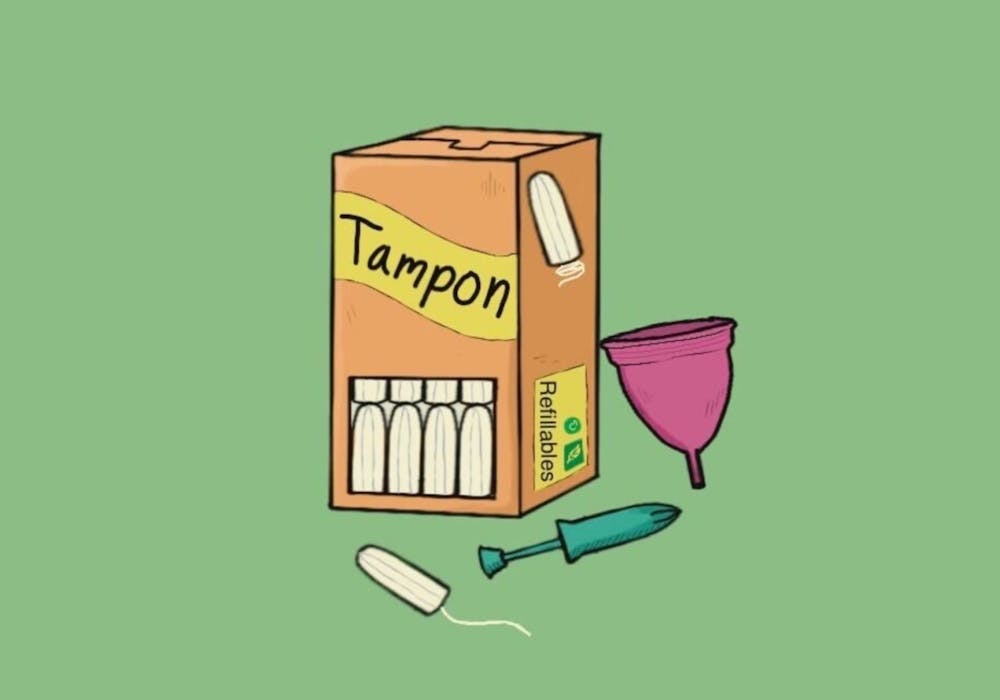Close to 20 billion sanitary napkins, tampons and applicators are dumped into North American landfills every year, according to Harvard University.
A study found that when wrapped in plastic bags, menstrual product waste can take centuries to biodegrade, leaving behind large amounts of waste because women, on average, use over 11,000 tampons throughout their lives.
However, there are a variety of alternatives for mainstream menstrual products that are not only more sustainable, but also more cost-efficient and include fewer health risks for the user. These products include menstrual cups, reusable pads,period underwear, cardboard tampons and tampons without an applicator.
Genetics and molecular genomics junior Zoe Haden said the transition to these products can be intimidating at first, but has changed the way she has dealt with her cycle for the better.
Having used a menstrual cup and period underwear since her sophomore year in high school, Haden said she started using these alternatives because she did not like how her body was reacting to the chemicals in the popular disposable products she once used.
“Most tampons are bleach-treated and my body did not like that,” Haden said. “So I went down a rabbit hole, did a ton of research into alternative, eco-friendly, body-safe period products and I found that it works for me — so, I switched.”
Women are at risk of contracting toxic shock syndrome if a tampon is worn for over eight hours. A menstrual cup can be worn for as long as 12 hours until it needs to be emptied and rinsed.
Haden said due to the slight learning curve that comes with using a menstrual cup, she recommends users practice a few times at home to get comfortable with the product. When it came to menstrual underwear, she said, although it is more expensive than other products, she recommends it to anyone who is getting started out with sustainable menstrual devices.
While these alternatives may be on the pricier side, disposable products cost more in the long run.
According to the National Organization for Women, an American feminist organization, the average woman spends about $20 per cycle on menstrual products, adding up to about $18,000 over a lifetime. Menstrual cups and underwear don't have such costs; they last longer.
“I have had the same pair of my period underwear as I did in eighth grade,” Haden said. “They’re not only better for your own body; they're also better for the environment, you’re saving money.”
Disposable tampons with plastic applicators are a relatively new product, becoming mainstream about 60 years ago.
It began in 1921, when the first pack of Kotex, a disposable menstrual product, was mass-produced, making disposable and less sustainable period products the norm. By the 1960s, pad designs began to incorporate plastic as a base and by the 1970s, plastics could be molded into smooth, thin, flexible round shapes to be used as tampon applicators.
MSU student organization Mission Menstruation is challenging the tampon status quo by providing students with cardboard applicators instead of plastic applicators.
Mission Menstruation originally formed an advocacy program to bring awareness to the disparities women face when dealing with insufficient funds for free menstruation products. They have accomplished one of their goals by providing 13 free dispensers across campus, totaling over 13,500 period products.
Human biology senior Nupur Huria, the lead advocate for Mission Menstruation, said she wants to make sure students recognize the difference in the products and how sustainable products, such as the tampon with a cardboard applicator, can benefit the health of the user.
“If you’re not always properly checking what is going into those materials on the back of the box, there can be toxins,” Huria said. “With reusable products, you’re the one that is sanitizing them. ... You have a lot more control of what is going in and on your body.”
Mission Menstruation revolutionized accessibility at MSU for students, Huria said, but there is still more work to be done. Her vision for the club is to provide free sustainable products throughout all buildings on campus.
To accomplish this, Huria and Mission Menstruation are looking for help from the Associated Students of MSU's Office of Sustainability.
ASMSU Director of Sustainability Cody Evans said he wants to partner and work with All Matters, a sustainable period product company, and their “Campus Cup” program, which gives out free, sustainable reusable period products on college campuses — such as menstrual cups and period underwear.
Realizing the impact Mission Menstruation has had on MSU’s campus, Evans said the progress the club has made since 2018 is a step in the right direction. He said a partnership between All Matters and Mission Menstruation could create an even better project to support the needs of everyone who uses a period product on campus.







